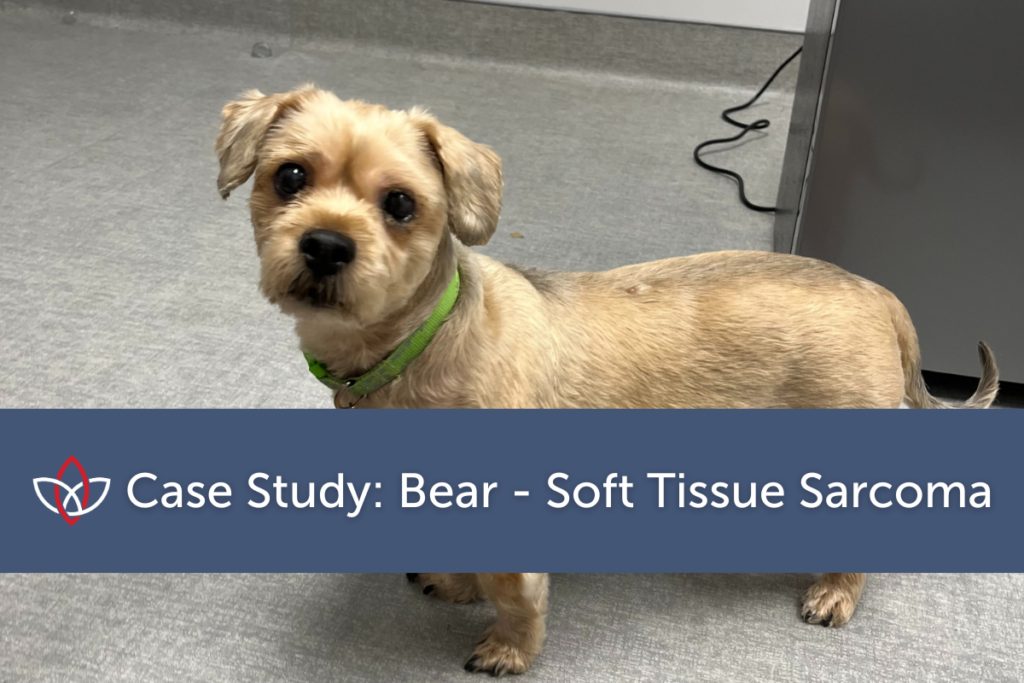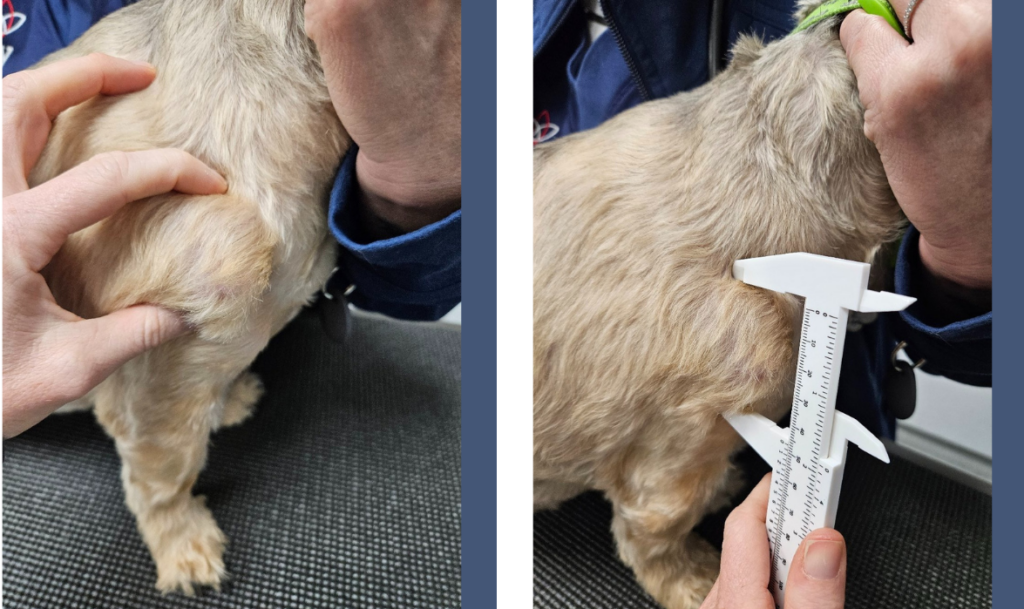
Soft Tissue Carcinoma
This is Bear, a 12.5-year-old neutered Shih Tzu Mix. In late summer 2022, Bear’s owners noticed a mass on his right shoulder. The mass grew quickly, was removed in January 2023, and was diagnosed as a grade 1 soft tissue sarcoma that was incompletely excised.
Unfortunately, the tumor started to regrow in September 2023 and grew quickly. Bear’s primary veterinarian at West Frederick Veterinary Hospital referred him to Partner’s Oncology department in Frederick for further discussion of a suspected recurrent soft tissue sarcoma and treatment options. Dr. Michelle Silver, DVM, DACVIM(O) and her team took Bear under their care.

Physical examination revealed a large, firm, semi-fixed mass along the right shoulder.

In preparation for planned anesthesia, Bear had routine bloodwork done to ensure there were not any new concerns, chest x-rays to rule our evidence of metastasis, and aspiration of the right shoulder mass to confirm our suspicion of recurrent disease. His surgery consisted of mass removal and scar revision. The mass was diagnosed as a grade I soft tissue sarcoma and it was completely excised, so no additional therapy was needed.
Bear did well after surgery. His most recent visit on April 7, 2024 showed that he has no new masses and there is no evidence of recurrence. We will continue to monitor Bear with recheck exams once every three months.
What We Know
Soft tissue sarcomas are one of the most commonly diagnosed skin tumors in dogs and prognosis is most often based on the grade of the tumor. Soft tissue sarcomas are graded 1 through 3. Grade 1 and 2 soft tissue sarcomas are mostly locally aggressive and have a low risk of metastasis (10-20%). Grade 3 soft tissue sarcomas are aggressive locally (grow quickly) and have a 40% risk of spreading to other areas of the body. The most common site for metastasis is the lungs and less commonly the regional lymph nodes. To determine the extent of disease, staging tests are recommended. This includes chest radiographs to look for spread to the lungs, regional lymph node aspiration (if possible), bloodwork (complete blood count, chemistry panel), a urinalysis, and +/- abdominal ultrasound.
Surgical excision is the treatment of choice when possible. Depending on the location, complete excision may be difficult due to the microscopic tentacles these tumors create. If a tumor has been completely excised and is low grade, then monitoring is all that is usually needed.
For tumors that are incompletely excised, the main concern is for recurrence of the tumor along the scar. Most tumors that have been incompletely excised will usually recur within the first 12-18 months of surgery. Additional local therapy can include scar revision surgery (when possible) and/or radiation therapy. Metronomic chemotherapy has also been evaluated for these patients and has been found to be beneficial, however not as good as the combination of surgery and radiation.
If adequate margins are not obtained with a scar revision surgery or another surgery is not possible, then radiation therapy may be warranted. The goal of radiation is to try and clean up any residual disease that may remain to slow the risk for recurrence.
Metronomic chemotherapy. This is a treatment that has been used for dogs with grade 1 or 2 soft tissue sarcomas that have been incomplete or narrowly excised. This protocol includes a low dose of a chemotherapy agent in combination with an anti-inflammatory agent (piroxicam or rimadyl). The goal of this therapy is to slow the tumor from making new blood vessels, which in turn should slow the progression of the tumor. Side effects of the chemotherapy agent can include stomach upset (vomiting, diarrhea, lethargy, and decrease in appetite) and a decrease in their white blood cell count. Fortunately, significant side effects are uncommon and if they do occur, most patients are treated with oral medications at home.
Key Points:
-
Soft tissue sarcomas are a common diagnosis and more often seen in older dogs.
-
Soft tissue sarcomas are graded 1 though 3 and the grade is predictive of biologic behavior.
-
Staging tests are performed prior to treatment to look for any evidence of metastasis and any other possible medical issues that would dictate the best treatment options.
-
Surgical excision is the treatment of choice for soft tissue sarcomas.
Ready to fight cancer? So are we! If your pet has been diagnosed with cancer, contact us.
